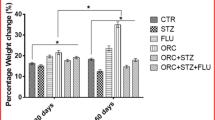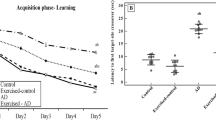Abstract
Testosterone replacement improves metabolic parameters and cognitive function in hypogonadism. However, the effects of testosterone therapy on cognition in obese condition with testosterone deprivation have not been investigated. We hypothesized that testosterone replacement improves cognitive function in testosterone-deprived obese rats by restoring brain insulin sensitivity, brain mitochondrial function, and hippocampal synaptic plasticity. Thirty male Wistar rats had either a bilateral orchiectomy (ORX: O, n = 24) or a sham operation (S, n = 6). ORX rats were further divided into two groups fed with either a normal diet (NDO) or a high-fat diet (HFO) for 12 weeks. Then, ORX rats in each dietary group were divided into two subgroups (n = 6/subgroup) and were given either castor oil or testosterone (2 mg/kg/day, s.c.) for 4 weeks. At the end of this protocol, cognitive function, metabolic parameters, brain insulin sensitivity, hippocampal synaptic plasticity, and brain mitochondrial function were determined. We found that testosterone replacement increased peripheral insulin sensitivity, decreased circulation and brain oxidative stress levels, and attenuated brain mitochondrial ROS production in HFO rats. However, testosterone failed to restore hippocampal synaptic plasticity and cognitive function in HFO rats. In contrast, in NDO rats, testosterone decreased circulation and brain oxidative stress levels, attenuated brain mitochondrial ROS production, and restored hippocampal synaptic plasticity as well as cognitive function. These findings suggest that testosterone replacement improved peripheral insulin sensitivity and decreased oxidative stress levels, but failed to restore hippocampal synaptic plasticity and cognitive function in testosterone-deprived obese rats. However, it provided beneficial effects in reversing cognitive impairment in testosterone-deprived non-obese rats.






Similar content being viewed by others
References
Akiyama T, Tachibana I, Shirohara H, Watanabe N, Otsuki M (1996) High-fat hypercaloric diet induces obesity, glucose intolerance and hyperlipidemia in normal adult male Wistar rat. Diabetes Res Clin Pract 31:27–35
Aon MA, Cortassa S, Akar FG, O'Rourke B (2006) Mitochondrial criticality: a new concept at the turning point of life or death. Biochim Biophys Acta 1762:232–240. doi:10.1016/j.bbadis.2005.06.008
Arakawa H (2005) Age dependent effects of space limitation and social tension on open-field behavior in male rats. Physiol Behav 84:429–436. doi:10.1016/j.physbeh.2005.01.008
Axell AM et al (2006) Continuous testosterone administration prevents skeletal muscle atrophy and enhances resistance to fatigue in orchidectomized male mice. Am J Physiol Endocrinol Metab 291:E506–E516. doi:10.1152/ajpendo.00058.2006
Aydilek N, Aksakal M (2005) Effects of testosterone on lipid peroxidation, lipid profiles and some coagulation parameters in rabbits. J Vet Med A Physiol Pathol Clin Med 52:436–439. doi:10.1111/j.1439-0442.2005.00764.x
Bassil N, Morley JE (2010) Late-life onset hypogonadism: a review. Clin Geriatr Med 26:197–222. doi:10.1016/j.cger.2010.02.003
Borst SE, Conover CF (2006) Orchiectomized Fischer 344 male rat models body composition in hypogonadal state. Life Sci 79:411–415. doi:10.1016/j.lfs.2006.01.035
Buletko AB, Dluzen DE, McDermott JL, Darvesh AS, Geldenhuys WJ (2012) Markers associated with testosterone enhancement of methamphetamine-induced striatal dopaminergic neurotoxicity. Neurotoxicol Teratol 34:338–343. doi:10.1016/j.ntt.2012.03.003
Candan N, Tuzmen N (2008) Very rapid quantification of malondialdehyde (MDA) in rat brain exposed to lead, aluminium and phenolic antioxidants by high-performance liquid chromatography-fluorescence detection. Neurotoxicology 29:708–713. doi:10.1016/j.neuro.2008.04.012
Chai JK, Blaha V, Meguid MM, Laviano A, Yang ZJ, Varma M (1999) Use of orchiectomy and testosterone replacement to explore meal number-to-meal size relationship in male rats. Am J Physiol 276:R1366–R1373
Christoffersen BO, Gade LP, Golozoubova V, Svendsen O, Raun K (2010) Influence of castration-induced testosterone and estradiol deficiency on obesity and glucose metabolism in male Gottingen minipigs. Steroids 75:676–684. doi:10.1016/j.steroids.2010.04.004
Cortassa S, Aon MA, Winslow RL, O'Rourke B (2004) A mitochondrial oscillator dependent on reactive oxygen species. Biophys J 87:2060–2073. doi:10.1529/biophysj.104.041749
Cunningham GR, Toma SM (2010) Clinical review: why is androgen replacement in males controversial? J Clin Endocrinol Metab 96:38–52. doi:10.1210/jc.2010-0266
Cunningham RL, Giuffrida A, Roberts JL (2009) Androgens induce dopaminergic neurotoxicity via caspase-3-dependent activation of protein kinase Cdelta. Endocrinology 150:5539–5548. doi:10.1210/en.2009-0640
Donatucci C, Cui Z, Fang Y, Muram D (2014) Long-term treatment patterns of testosterone replacement medications. J Sex Med 11:2092–2099. doi:10.1111/jsm.12608
Emamian S, Naghdi N, Sepehri H, Jahanshahi M, Sadeghi Y, Choopani S (2010) Learning impairment caused by intra-CA1 microinjection of testosterone increases the number of astrocytes. Behav Brain Res 208:30–37. doi:10.1016/j.bbr.2009.11.004
Erben RG, Eberle J, Stahr K, Goldberg M (2000) Androgen deficiency induces high turnover osteopenia in aged male rats: a sequential histomorphometric study. J Bone Miner Res 15:1085–1098. doi:10.1359/jbmr.2000.15.6.1085
Gao W, Reiser PJ, Coss CC, Phelps MA, Kearbey JD, Miller DD, Dalton JT (2005) Selective androgen receptor modulator treatment improves muscle strength and body composition and prevents bone loss in orchidectomized rats. Endocrinology 146:4887–4897. doi:10.1210/en.2005-0572
Gentry RT, Wade GN (1976) Androgenic control of food intake and body weight in male rats. J Comp Physiol Psychol 90:18–25
Georgiev IP et al (2011) Effects of castration-induced visceral obesity and antioxidant treatment on lipid profile and insulin sensitivity in New Zealand white rabbits. Res Vet Sci 90:196–204. doi:10.1016/j.rvsc.2010.05.023
Grossmann M et al (2008) Low testosterone levels are common and associated with insulin resistance in men with diabetes. J Clin Endocrinol Metab 93:1834–1840. doi:10.1210/jc.2007-2177
Haffner SM, Karhapaa P, Mykkanen L, Laakso M (1994) Insulin resistance, body fat distribution, and sex hormones in men. Diabetes 43:212–219
Harooni HE, Naghdi N, Sepehri H, Rohani AH (2008) Intra hippocampal injection of testosterone impaired acquisition, consolidation and retrieval of inhibitory avoidance learning and memory in adult male rats. Behav Brain Res 188:71–77. doi:10.1016/j.bbr.2007.10.017
Hogervorst E, Williams J, Budge M, Barnetson L, Combrinck M, Smith AD (2001) Serum total testosterone is lower in men with Alzheimer's disease. Neuro Endocrinol Lett 22:163–168
Hogervorst E, Bandelow S, Combrinck M, Smith AD (2004) Low free testosterone is an independent risk factor for Alzheimer's disease. Exp Gerontol 39:1633–1639. doi:10.1016/j.exger.2004.06.019
Isidori AM et al (2005) Effects of testosterone on body composition, bone metabolism and serum lipid profile in middle-aged men: a meta-analysis. Clin Endocrinol (Oxf) 63:280–293. doi:10.1111/j.1365-2265.2005.02339.x
Janowsky JS (2006) Thinking with your gonads: testosterone and cognition. Trends Cogn Sci 10:77–82. doi:10.1016/j.tics.2005.12.010
Kakolewski JW, Cox VC, Valenstein ES (1968) Sex differences in body-weight change following gonadectomy of rats. Psychol Rep 22:547–554
Kenny AM, Fabregas G, Song C, Biskup B, Bellantonio S (2004) Effects of testosterone on behavior, depression, and cognitive function in older men with mild cognitive loss. J Gerontol A Biol Sci Med Sci 59:75–78
Khorshidahmad T et al (2012) Interactive effects of a protein kinase AII inhibitor and testosterone on spatial learning in the Morris water maze. Behav Brain Res 228:432–439. doi:10.1016/j.bbr.2011.12.028
Lu PH et al (2006) Effects of testosterone on cognition and mood in male patients with mild Alzheimer disease and healthy elderly men. Arch Neurol 63:177–185. doi:10.1001/archneur.63.2.nct50002
Maki PM et al (2007) Intramuscular testosterone treatment in elderly men: evidence of memory decline and altered brain function. J Clin Endocrinol Metab 92:4107–4114. doi:10.1210/jc.2006-1805
Margo K, Winn R (2006) Testosterone treatments: why, when, and how? Am Fam Physician 73:1591–1598
Marin P et al (1992) The effects of testosterone treatment on body composition and metabolism in middle-aged obese men. Int J Obes Relat Metab Disord 16:991–997
Mateos R, Lecumberri E, Ramos S, Goya L, Bravo L (2005) Determination of malondialdehyde (MDA) by high-performance liquid chromatography in serum and liver as a biomarker for oxidative stress. Application to a rat model for hypercholesterolemia and evaluation of the effect of diets rich in phenolic antioxidants from. J Chromatogr B Analyt Technol Biomed Life Sci 827:76–82. doi:10.1016/j.jchromb.2005.06.035
Meydan S et al (2010) Effects of testosterone on orchiectomy-induced oxidative damage in the rat hippocampus. J Chem Neuroanat 40:281–285. doi:10.1016/j.jchemneu.2010.07.006
Muriach M, Flores-Bellver M, Romero FJ, Barcia JM (2014) Diabetes and the brain: oxidative stress, inflammation, and autophagy. Oxid Med Cell Longev 2014:102158. doi:10.1155/2014/102158
Naghdi N, Asadollahi A (2004) Genomic and nongenomic effects of intrahippocampal microinjection of testosterone on long-term memory in male adult rats. Behav Brain Res 153:1–6. doi:10.1016/j.bbr.2003.10.027
Naghdi N, Majlessi N, Bozorgmehr T (2005) The effect of intrahippocampal injection of testosterone enanthate (an androgen receptor agonist) and anisomycin (protein synthesis inhibitor) on spatial learning and memory in adult, male rats. Behav Brain Res 156:263–268. doi:10.1016/j.bbr.2004.05.032
Pintana H, Apaijai N, Pratchayasakul W, Chattipakorn N, Chattipakorn SC (2012) Effects of metformin on learning and memory behaviors and brain mitochondrial functions in high fat diet induced insulin resistant rats. Life Sci 91:409–414. doi:10.1016/j.lfs.2012.08.017
Pintana H, Apaijai N, Chattipakorn N, Chattipakorn SC (2013) DPP-4 inhibitors improve cognition and brain mitochondrial function of insulin resistant rats. J Endocrinol 218:1–11. doi:10.1530/JOE-12-0521
Pintana H, Sripetchwandee J, Supakul L, Apaijai N, Chattipakorn N, Chattipakorn S (2014) Garlic extract attenuates brain mitochondrial dysfunction and cognitive deficit in obese-insulin resistant rats. Appl Physiol Nutr Metab 39:1373–1379. doi:10.1139/apnm-2014-0255
Pipatpiboon N, Pratchayasakul W, Chattipakorn N, Chattipakorn SC (2012) PPARgamma agonist improves neuronal insulin receptor function in hippocampus and brain mitochondria function in rats with insulin resistance induced by long term high-fat diets. Endocrinology 153:329–338. doi:10.1210/en.2011-1502
Pipatpiboon N, Pintana H, Pratchayasakul W, Chattipakorn N, Chattipakorn SC (2013) DPP4-inhibitor improves neuronal insulin receptor function, brain mitochondrial function and cognitive function in rats with insulin resistance induced by high-fat diet consumption. Eur J Neurosci 37:839–849. doi:10.1111/ejn.12088
Pongkan W, Chattipakorn SC, Chattipakorn N (2015) Chronic testosterone replacement exerts cardioprotection against cardiac ischemia-reperfusion injury by attenuating mitochondrial dysfunction in testosterone-deprived rats. PLoS One 10, e0122503. doi:10.1371/journal.pone.0122503
Pratchayasakul W, Kerdphoo S, Petsophonsakul P, Pongchaidecha A, Chattipakorn N, Chattipakorn SC (2011) Effects of high-fat diet on insulin receptor function in rat hippocampus and the level of neuronal corticosterone. Life Sci 88:619–627. doi:10.1016/j.lfs.2011.02.003
Sakata K, Tokue A, Kawai N (2000) Altered synaptic transmission in the hippocampus of the castrated male mouse is reversed by testosterone replacement. J Urol 163:1333–1338
Sandstrom NJ, Kim JH, Wasserman MA (2006) Testosterone modulates performance on a spatial working memory task in male rats. Horm Behav 50:18–26. doi:10.1016/j.yhbeh.2005.09.008
Shi Z, Araujo AB, Martin S, O'Loughlin P, Wittert GA (2013) Longitudinal changes in testosterone over five years in community-dwelling men. J Clin Endocrinol Metab 98:3289–3297. doi:10.1210/jc.2012-3842
Siddiqui IA, Raisuddin S, Shukla Y (2005) Protective effects of black tea extract on testosterone induced oxidative damage in prostate. Cancer Lett 227:125–132. doi:10.1016/j.canlet.2004.10.046
Spritzer MD, Daviau ED, Coneeny MK, Engelman SM, Prince WT, Rodriguez-Wisdom KN (2011) Effects of testosterone on spatial learning and memory in adult male rats. Horm Behav 59:484–496. doi:10.1016/j.yhbeh.2011.01.009
Sripetchwandee J, Pipatpiboon N, Chattipakorn N, Chattipakorn S (2014) Combined therapy of iron chelator and antioxidant completely restores brain dysfunction induced by iron toxicity. PLoS One 9, e85115. doi:10.1371/journal.pone.0085115
Stellato RK, Feldman HA, Hamdy O, Horton ES, McKinlay JB (2000) Testosterone, sex hormone-binding globulin, and the development of type 2 diabetes in middle-aged men: prospective results from the Massachusetts male aging study. Diabetes Care 23:490–494
Stranahan AM, Norman ED, Lee K, Cutler RG, Telljohann RS, Egan JM, Mattson MP (2008) Diet-induced insulin resistance impairs hippocampal synaptic plasticity and cognition in middle-aged rats. Hippocampus 18:1085–1088. doi:10.1002/hipo.20470
Vaughan C, Goldstein FC, Tenover JL (2007) Exogenous testosterone alone or with finasteride does not improve measurements of cognition in healthy older men with low serum testosterone. J Androl 28:875–882. doi:10.2164/jandrol.107.002931
Vorhees CV, Williams MT (2006) Morris water maze: procedures for assessing spatial and related forms of learning and memory. Nat Protoc 1:848–858. doi:10.1038/nprot.2006.116
Warner DS, Sheng H, Batinic-Haberle I (2004) Oxidants, antioxidants and the ischemic brain. J Exp Biol 207:3221–3231. doi:10.1242/jeb.01022
Wolf OT, Preut R, Hellhammer DH, Kudielka BM, Schurmeyer TH, Kirschbaum C (2000) Testosterone and cognition in elderly men: a single testosterone injection blocks the practice effect in verbal fluency, but has no effect on spatial or verbal memory. Biol Psychiatry 47:650–654
Funding
This work was supported by grants from the Thailand Research Fund TRF-BRG5780016 (SC), TRF-TRG5680018 (WP), the Royal Golden Jubilee PhD program (PHD/0025/2555 HP&SC), National Research Council of Thailand (SC), a NSTDA Research Chair Grant from the National Science and Technology Development Agency Thailand (NC), and Chiang Mai University Excellent Center Award (NC).
Conflict of interest
The authors declare that they have no conflict of interest.
Author information
Authors and Affiliations
Corresponding author
About this article
Cite this article
Pintana, H., Pongkan, W., Pratchayasakul, W. et al. Testosterone replacement attenuates cognitive decline in testosterone-deprived lean rats, but not in obese rats, by mitigating brain oxidative stress. AGE 37, 84 (2015). https://doi.org/10.1007/s11357-015-9827-4
Received:
Accepted:
Published:
DOI: https://doi.org/10.1007/s11357-015-9827-4




